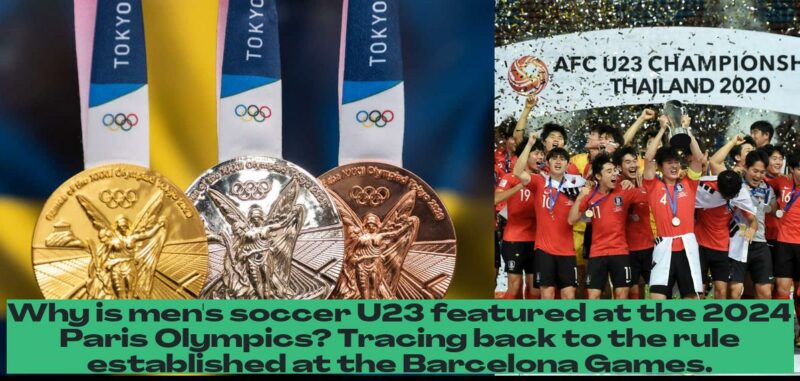Why is men’s soccer U23 at the 2024 Paris Olympics? Explaining a rule that dates back to the Barcelona Games
You’re likely wondering why men’s soccer at the Olympics isn’t a full-fledged, star-studded affair like the World Cup. Instead, it features an under-23 tournament, allowing only three players over the age of 23 per team. Why this age restriction? It all boils down to a strategic decision made by FIFA, the governing body for world football, to ensure the FIFA World Cup remains the ultimate pinnacle of men’s international soccer. Let’s delve into the reasons behind this rule and its impact on the Olympics.
- The under-23 rule for men’s soccer at the Olympics dates back to the 1992 Barcelona Games, aimed at maintaining the FIFA World Cup as the pinnacle of men’s international soccer.
- FIFA implemented the age restriction to prevent the Olympics from overshadowing the World Cup and to ensure the latter remains the ultimate showcase for international talent.
- The under-23 tournament at the Olympics allows for a different kind of competition, focusing on developing young players and providing them with valuable international experience.
- While fans may miss seeing top stars like Messi or Ronaldo at the Olympics, the age restriction creates an opportunity for up-and-coming talents to shine on a global stage.
The FIFA World Cup Takes Center Stage
The FIFA World Cup is the biggest stage in men’s football, and FIFA wants to keep it that way. The tournament attracts players from all corners of the globe, showcasing the pinnacle of international talent. Imagine a scenario where the Olympics featured the world’s best players, potentially overshadowing the World Cup. FIFA wasn’t about to let that happen. They recognized the need to maintain the World Cup’s unique position in the footballing landscape and set out to ensure it remained the undisputed champion of international men’s soccer.
By implementing the under-23 age restriction for the Olympics, FIFA struck a balance. It allows for a different kind of competition, focusing on developing players and giving them valuable experience on the world stage. While the Olympics may not see the likes of Lionel Messi, Cristiano Ronaldo, or Neymar, it provides an opportunity for up-and-coming stars to shine and gain international exposure.
A History of Balancing Act
The under-23 rule for men’s Olympic soccer wasn’t a sudden decision. It has its roots in the 1992 Barcelona Olympics, where FIFA introduced the restriction to avoid clashing with the FIFA World Cup. This move was met with mixed reactions, with some arguing that it diminished the Olympics’ prestige, while others felt it was a necessary measure to protect the World Cup’s supremacy. Ultimately, FIFA’s decision proved successful, ensuring the World Cup remained the ultimate showcase for men’s international football.
The under-23 rule has remained in place ever since, and it has become an integral part of the Olympic soccer landscape. While it may not be as glamorous as seeing the world’s best players compete in the Olympics, it has opened the door for a new generation of players to gain valuable experience and showcase their talent on a global stage. It’s a testament to FIFA’s commitment to preserving the World Cup’s unique status as the pinnacle of international men’s soccer.
The Impact on the Olympics
The under-23 rule has had a significant impact on the Olympics. It has created a distinct identity for the Olympic football tournament, separating it from the World Cup. The Olympics have become a platform for emerging talent, showcasing the next generation of players who aspire to one day compete on the world stage. The tournament has also provided opportunities for countries with developing football programs to compete on an international level, promoting the growth of the sport globally.
While the under-23 rule may not be universally popular, it has served its purpose. It has allowed the Olympic football tournament to flourish as a platform for developing players, without overshadowing the FIFA World Cup. The Olympics have become a breeding ground for future stars, and the under-23 rule has played a vital role in making this happen.
The Future of Olympic Soccer
The under-23 rule is likely to remain in place for the foreseeable future. FIFA has no plans to change its stance on the issue, recognizing the importance of maintaining the World Cup’s status as the pinnacle of international men’s soccer. However, there are ongoing discussions about the possibility of introducing a “veteran” rule, allowing a limited number of players over the age of 23 to participate in the Olympics. This would allow for a balance between developing talent and adding experienced players to the tournament.
The future of Olympic soccer is uncertain, but the under-23 rule is likely to remain a significant factor. It has shaped the tournament’s identity and created a unique platform for developing players. As the sport continues to evolve, the Olympic football tournament will undoubtedly adapt and continue to contribute to the global development of the beautiful game.
Key Takeaways:
- FIFA’s strategic decision: The under-23 age restriction for men’s Olympic soccer was implemented to ensure the FIFA World Cup remains the top international men’s soccer competition.
- Preserving the World Cup’s supremacy: FIFA aimed to prevent the Olympics from overshadowing the World Cup by restricting the participation of established, top-tier players.
- Focus on developing players: The under-23 rule provides a platform for emerging talent, giving them a chance to shine on the international stage.
- A balancing act: The under-23 rule has created a distinct identity for Olympic soccer, allowing it to flourish while maintaining the World Cup’s prestige.
- Ongoing discussions about the future: While the under-23 rule is likely to remain in place, there are ongoing discussions about potentially introducing a “veteran” rule to add experienced players to the tournament.
Beyond the Pitch: The Olympics’ Broader Impact
The Olympics are more than just a sporting event. They are a global celebration of athleticism, unity, and cultural exchange. The Games bring together athletes from around the world, fostering international cooperation and promoting peace. The Olympics are a powerful symbol of human potential and the pursuit of excellence, inspiring athletes and audiences alike.
The inclusion of men’s soccer in the Olympics, even with its under-23 format, adds to the Games’ appeal and diversity. It provides a platform for the sport to reach a wider audience and inspire a new generation of athletes. The Olympic spirit of fair play, camaraderie, and respect is reflected in the football tournament, where athletes from different cultures come together to compete in the spirit of sportsmanship.
The Future of the Olympic Games
The Olympics are constantly evolving, adapting to changing times and incorporating new sports into the program. The 2024 Paris Games will feature new events like breaking (breakdancing) and kayak cross, demonstrating the Games’ commitment to innovation and inclusivity. The future of the Olympics is bright, with a focus on expanding the reach of the Games and attracting new audiences.
The Olympics will continue to play a vital role in promoting international understanding and cooperation, while showcasing the best of human athletic performance. The Games will remain a source of inspiration and a symbol of global unity for generations to come.









